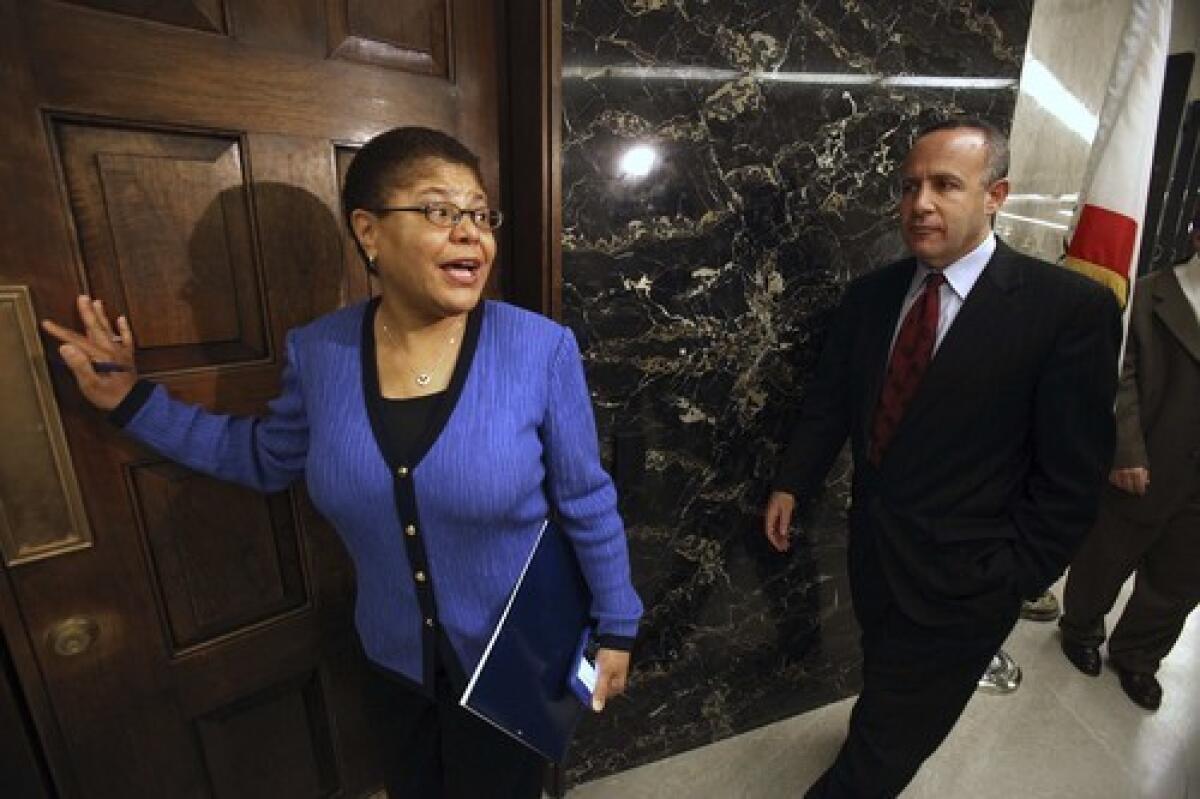Budget’s a mess, but it’s our mess

Sacramento’s latest budget product may be the worst ever -- and the very best possible given the reality of California politics.
Liberal interests are crying about painful spending cuts and no new taxes, not even on big oil or smelly tobacco. Republican legislators are fretting over the potential early release from prison of nonviolent inmates. Reformers carp about gimmicky accounting.
But Rick Simpson, a longtime Capitol hand and senior policy advisor for Assembly Democrats, puts it all in perspective: “I always distinguish between the best possible solution and the best solution possible. This is the best solution possible.”
The negotiated solution to the state’s projected $26-billion budget deficit -- roughly $15 billion in spending cuts, and the rest mostly in raids on local government, problematic revenue and accounting tricks -- was preordained by the May 19 special election.
The electorate soundly rejected the plan by Gov. Arnold Schwarzenegger and the Legislature to create a modest spending cap, raise nearly $6 billion in general fund revenue immediately and generate $16 billion in future tax hikes. Liberal groups adamantly opposed the spending cap. Conservatives hated the taxes. And the $6 billion in immediate revenue went down with the rest of it.
After that, any new tax increase was politically impossible. To think otherwise was fantasy, especially since taxes already had been hiked by a hefty $12.5 billion in February.
Liberal interests demanded higher taxes, but Democrats only went through the motions of seeking them in the Legislature. With a two-thirds majority vote required and Republicans strongly opposed, state tax increases have become a rarity in California.
Right-wingers rooting for state government to collapse and be rebuilt on the cheap under bankruptcy laws also were hallucinating. Under the U.S. Constitution, states cannot declare bankruptcy. And even if they could, there are enough sane people left in Sacramento to have headed it off.
Opponents of the ballot measures -- including many of the Democrats’ traditional labor, education and welfare allies -- “left us holding the bag the day after the election,” Assembly Speaker Karen Bass (D-Los Angeles) complained in an interview. “We could have cut $6 billion less.”
Bass also is irked that the budget wasn’t settled in late June before the state was forced to pay bills with expensive IOUs. The scrip not only costs the state interest, but every day without a balanced budget adds $25 million to the projected deficit.
“Ninety percent” of the budget-balancing package that the Legislature will finally vote on today or Friday, Bass asserts, could have been passed before July 1. The state then could have avoided embarrassing IOUs, she says, while legislators and the governor continued to negotiate more cuts.
Schwarzenegger didn’t trust Democrats to agree to previously unthinkable whacks in education and the poor people’s safety net unless the state faced imminent insolvency. He wanted to fix the “crazy deficit spending” once and for all.
This budget hardly does that. It “kicks the can down the alley,” which the governor for weeks had vowed he wouldn’t do.
“What are the odds we’re going to be back at this in the fall?” Bass asks, answering her own question. “Pretty high.” The economy shows little sign of rebounding.
Declared Senate leader Darrell Steinberg (D-Sacramento): “I don’t like the idea of kicking the can down the alley, but doing a little of that is better than kicking a lot of people out into the street.”
The governor did obtain some long-sought anti-fraud reforms in home care services for the aged, blind and disabled. Providers will undergo background checks and be fingerprinted. Beneficiaries also will be fingerprinted to make sure they actually exist and aren’t merely some scam artist’s creation.
Democrats -- subtly ridiculing Republicans -- inserted an amendment exempting hand amputees from being fingerprinted.
Schwarzenegger also won some “reforms” -- cutbacks -- in CalWorks. “For too long, our state’s welfare program has been too lenient and too generous,” asserted the governor’s office. Work requirements will be tightened.
Another significant budget change the governor fought for and obtained was elimination of automatic annual cost-of-living adjustments for virtually all programs, from welfare to universities to the courts.
Everybody has been claiming -- particularly the governor and fellow Republicans -- that the $84-billion general fund budget will be balanced without raising taxes. Don’t believe it.
It’s a matter of semantics.
At Schwarzenegger’s recommendation, the negotiators agreed to accelerate income tax withholding and estimated quarterly payments to generate a one-time revenue windfall of $2.3 billion. That windfall will never be returned; the payment acceleration never rescinded. There’ll be the usual rebates for tax overpayments, but the state will always be ahead that bonus $2.3 billion.
If the government takes extra tax money and keeps it, that’s a one-time tax hike.
Just as when Sacramento seizes money from cities and counties, it is not “living within its means,” as Schwarzenegger pledged the state would.
But that’s OK. Right now, the most important thing is to slap on a tourniquet and stop the bleeding that is flowing mainly from the worst recession since the Great Depression. Get the cash flowing. Revive the credit ratings.
There’s a classic quote from the German politician Otto von Bismarck: “Politics is the art of the possible.” Schwarzenegger and legislative leaders finally boned up on Bismarck.
More to Read
Start your day right
Sign up for Essential California for news, features and recommendations from the L.A. Times and beyond in your inbox six days a week.
You may occasionally receive promotional content from the Los Angeles Times.







